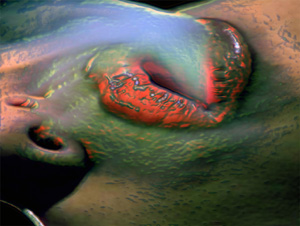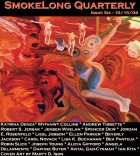When I saw in your bio that you lived in Chicago, I got curious and googled you (being a Chicago boy myself originally). Are you the same Spencer Dew who was injured in the terrorist attack in Jerusalem? What are your opinions on current events in the Middle East?
As a writer, I wanted a firsthand look at the intifada, its dynamics. I wanted to experience the banalities of life in a country under constant threat of terrorist attack. But I also went to work on my Hebrew, feeling that traditional Jewish hermeneutic modes – midrash and Talmud – provide rich and essential theories for contemporary literature, offering a template for work that — pushing on from the experiments of Burroughs, say, or Acker – can quite literally change the world.
After the bombing, and after receiving very quick and calm treatment (the man who did my x-rays reminded me several times that the constant hospital drills are more chaotic than the actual emergencies) the head of the hospital press relations department asked me to speak to the assembling media. I was picked because I was an American, a foreigner, and I spoke because I felt I had a responsibility to speak, because the media would insist on getting sound bites from someone and because I, as one of the few Americans there and not killed, was somehow a more privileged voice, and because I felt that I could try to say things that were responsible, considered, that could not be used as ammunition for anyone’s selfish political schemes.
The situations in the vast expanse categorized as “the Middle East” are for the most part the results of selfish individuals, twisting complicated political history for their own uses. Arafat and Bush offer interesting parallels.
But the media, the industry of it, is part of the problem, too, seeking the sensational, reducing situations to the barest distorted skeletons of themselves.
I had intended not to answer this question, but either choice would have been difficult to live with – we as artists must constantly wrestle with the issue of when we have a responsibility to speak and when we have a responsibility to remain silent. Making art under the assumption that it is apolitical in nature is, in fact, a very dangerous political act. This certainly doesn’t mean that we must write things that read like talking points from a party platform – that’s an equally asinine assumption, one that produces propaganda, not art.
Responsible art must be honest, true to the senses, must convey sensuality without offering placation. Art must offer a multivalent critique, acknowledging ambiguity and resisting reductionism. Art must deny the comfort of isolation from the world by rejecting both solipsism and the illusion of the apolitical. Artistic work must haunt those who encounter them, viscerally and intellectually.
I love the woman in this piece. In some ways, she embodies the whole flash form for me: unexpected, transitioning quickly, excising unnecessary content. Was that intentional?
Yes.
What drives you to write?
This piece started as a couple of journal lines: one about a winter night on a porch, more or less, and one about prescription anti-depressives. Psychiatric medicines are funny – corporate commodity, mass mood control, object of absurd and ubiquitous ad campaigns, yet also part of our collective image bank of nostalgic and therefore erotic imagery. So memory is a drive – lived and read experiences recurring, phrases present themselves, calling for other phrases to be fashioned.
What are some of the things about the writing scene in Chicago that you like?
I don’t guess I’m part of a scene. Chicago is fantastic, certainly, and thick with all the clichéd resources –lectures and exhibits, taxidermy collections and all-night taquerias. This piece, however, was written in a village in Vermont, and while everything there closed by eight o’clock at night, there was just as much raw material for literature.
Do you write other forms besides flash? What mental adjustments do you need to make when switching forms?
I have spent the most time on novels, working on a quartet since 1996. That form has advantages in terms of structural strength, characters, a depth of texture. But what ultimately propels any novel is good poetry, clarity and convulsion of imagery, and that element should be able to stand alone in short work, radically condensed. So I think the egg of the idea is the same for any length of work, and often, for me, a single piece will expand and contract and morph around until it settles in a mature shape.



 The core workshop of SmokeLong Fitness is all in writing, so you can take part from anywhere at anytime. We are excited about creating a supportive, consistent and structured environment for flash writers to work on their craft in a community. We are thrilled and proud to say that our workshop participants have won, placed, or been listed in every major flash competition. Community works.
The core workshop of SmokeLong Fitness is all in writing, so you can take part from anywhere at anytime. We are excited about creating a supportive, consistent and structured environment for flash writers to work on their craft in a community. We are thrilled and proud to say that our workshop participants have won, placed, or been listed in every major flash competition. Community works.